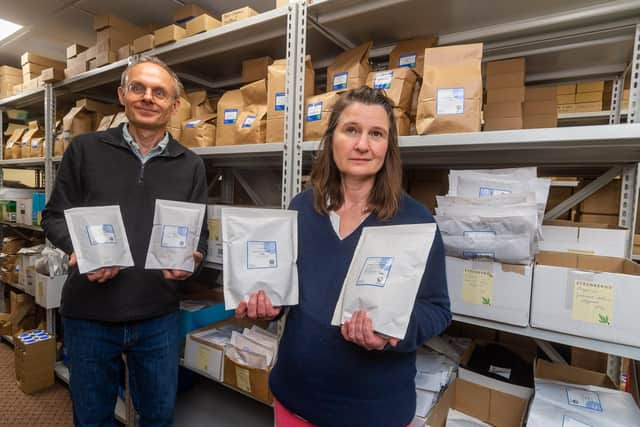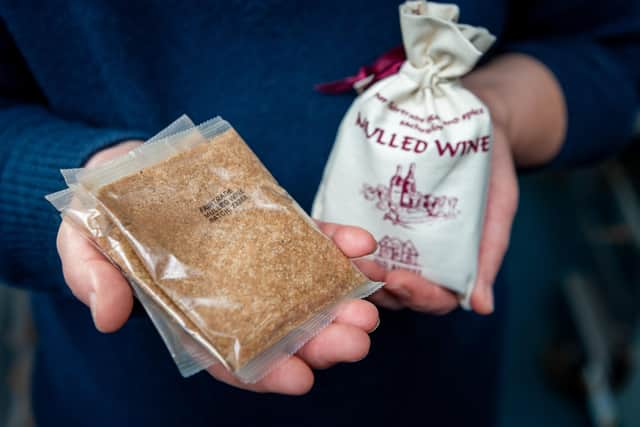The Yorkshire spice company doing their bit to save the planet


“The problem is that at the moment sustainability costs you a lot of money. If you were doing it purely on economic grounds then you wouldn’t do it, but sometimes you just have to do the right thing.”
Axel, along with wife Sophie, founded their Melmerby-based business in 2003 and from the off they were committing to being ethically sound. Conscious that a lot of their products were imported from as far afield as India, they were keen to offset their carbon usage from the beginning.
Advertisement
Hide AdAdvertisement
Hide Ad“All of our spices and teas come by boat from ethical suppliers, nothing comes by air and to start with we paid to offset our carbon usage, but I realised four or five years ago that was a bit of a cop out really,” says Axel.


“I felt that if we were really committed to doing our bit to save the planet and to becoming carbon neutral then we really had to put our money where our mouth is and actually do something.”
They set about reducing their carbon emission and energy use as much as possible, often by simple and subtle changes.
“We set ourselves a zero carbon target by 2025. We changed all our lighting from conventional bulbs to LED, we put motion sensors into rooms that aren’t used that much like the toilets, and also embarked on training people to do simple things like turn off the lights when they leave a room and turn off their computers, which we also upgraded to be more energy efficient, at the end of the day,” says Axel.
Advertisement
Hide AdAdvertisement
Hide AdThey moved their energy supplier to Octopus who only use green, renewable energy sources. “It’s something all of us can do,” says Axel.
They already had solar panels on part of the factory but a lot of the energy it produced was going into the national grid.
The solar panels now generate 40 per cent of Steenbergs’ electricity which they store in recently purchased 115 kw batteries.
All this means that they have hit their carbon emission target when it comes to energy efficiency four years early.
Advertisement
Hide AdAdvertisement
Hide Ad“There is still a lot to do and we are looking at things such as travel and transport in and out of our products. You can’t do everything at once, we realise that, and there will be people who will pull us up on things but we don’t claim to be perfect but we believe it is important to start somewhere.”
Axel believes one of the main problems is that there is no government support to encourage business to become sustainable.
“With the problems in gas supply and CO2 at the moment we have the opportunity to look at the way we do things. It is a chance to look at doing things more sustainably but governments are far too short-sighted to look at the long term consequences of what we are doing to the planet – they look at a four or five-year cycle. Businesses have to answer to the stock market and so hardly ever look beyond a year. But the environment doesn’t work like that. What we do now has consequences in hundreds of years”
Back at the Melmerby factory, the Steenbergs are going even further to help the environment.
Advertisement
Hide AdAdvertisement
Hide AdThey have introduced plastic free biofilm in their packaging supplied by a Yorkshire company.
They reuse all cardboard boxes and keep waste down to a minimum. They even have a seed roof once again to improve biodiversity.
All the goods they now sell are vegan and recipes added to their website are plant-based.
“We aren’t trying to preach to people,” says Axel. “ We eat meat but we have reduced how much of it we consume. If people just went meat-free once or twice a week it would make such a massive difference to the amount of CO2 we produce in this country.”
Advertisement
Hide AdAdvertisement
Hide AdIn a bid to look to the future and problem of biodiversity the Steenbrergs bought a wood in Wales.
They bought the 50 acres of agricultural land which had a small wood on it just before lockdown. They employed a forester and planted 40,000 trees with plans for another 1,000 this year which will capture 18,000 tonnes of carbon.
“Our wood is about doing something genuine for the planet, getting our hands dirty and working with a real natural space, where we can show you what we are doing for a better future, rather than wafting around a (virtual) piece of paper about green policies and certifications.,” says the father of two.
Comment Guidelines
National World encourages reader discussion on our stories. User feedback, insights and back-and-forth exchanges add a rich layer of context to reporting. Please review our Community Guidelines before commenting.